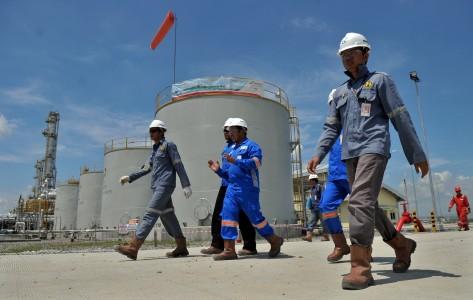Indonesia Clears Path for Geothermal Energy as Power Needs Rise
Indonesia could follow Philippines, where geothermal fuel meets a quarter of electricity use

Indonesia could follow Philippines, where geothermal fuel meets a quarter of electricity use
Bareksa.com - Indonesia has unveiled ambitious targets to triple geothermal power output this decade, introducing a series of land and regulatory reforms aimed at becoming the world's largest producer of the fossil fuel alternative.
Sat atop the volcanic Pacific Ring of Fire, the world's fourth-most populous nation is anxious to exploit geothermal energy as a clean and abundant power source as it races to attract investors and meet soaring power demand.
"With Indonesia increasingly having to import oil, coupled with a growing electricity demand, it is critical that it diversifies it base for electricity generation," said Chris de Lavigne of consultancy Frost & Sullivan. "Indonesia has the potential to become the world's largest producer of geothermal."
Promo Terbaru di Bareksa
As the world's third biggest geothermal producer with a capacity of 1.4 gigawatt (GW), Indonesia lags behind the Philippines and the United States with capacities of 1.9 and 3.4 GW each. Indonesia aims to up its capacity by 4.9 GW by 2019.
Yet progress has been slow due to red tape, uncompetitive power tariffs and uncertainty over asset ownership. The 25 years it has taken from the planning stage to breaking ground on its latest project show the formidable barriers the sector faces.
The government says reforms to curb the power of regional authorities to intrude on projects, as well as to make it easier to build in forest areas, should accelerate development of 25 project sites due for tender in early 2015.
"There are no more obstacles in this sector. It's time for us to work. It is a business opportunity," said Tisnaldi, director of geothermal, directorate general of renewable energy and energy conservation at the energy and mines ministry.
Geothermal investors hope the new government of President Joko Widodo will follow up with plans to reform power price caps in the same way it reduced subsidies for transport fuel, as well as tackle other obstacles.
"If you can lift the hurdle behind land acquisition and permits, that will help," said Fazil Alfitri, president director at PT Medco Power Indonesia, a firm active in geothermal power.
Geothermal projects typically tap heat below the earth's crust by pumping water into deep wells where it is converted into steam to drive turbines.
But they are susceptible to red-tape given they usually need long-term, complex government policy commitments. They also came under Indonesian mining laws, restricting developments in forest areas until recent amendments.
Indonesia's plans could see geothermal meet 10 percent of power demand by 2020, up from 3 percent today. Currently about half of power supplies are met by coal, a fuel it is keen to use less in order to boost exports. Gas makes up about 20 percent and oil 12 percent.
Many geothermally active countries are planning new plants, with global capacity jumping from 2 to 12 GW since 1980.
Frost and Sullivan's Lavigne said Indonesia's geothermal capacity could be as high as 29 GW, almost two-thirds of the country's current overall generation.
"GAME CHANGER"
The $1.6 billion Sarulla project in North Sumatra, the world's biggest, saw construction start this year, 25 years after it was first planned, delayed largely by a lack of finance and red tape.
Describing Sarulla as a "game-changer", Shamim Razavi, an energy lawyer at Norton Rose Fulbright, said it would mean financers would be prepared to look for new projects.
Most of the biggest existing plants, such as Chevron's Salak, are on densely populated Java island.
Sarulla will connect to the national grid, although some plants in remote spots are restricted to serving local areas. The 25 new sites set for tender in early 2015 are mostly in forest areas in Java and Sumatra. Sarulla will have a capacity of 330 MW, enough to power about 330,000 homes.
If successful, Indonesia could follow its Southeast Asian neighbour the Philippines, where geothermal fuel meets a quarter of electricity use, reducing pollution and fuel imports. (Source : Reuters)
Pilihan Investasi di Bareksa
Klik produk untuk lihat lebih detail.
| Produk Eksklusif | Harga/Unit | 1 Bulan | 6 Bulan | YTD | 1 Tahun | 3 Tahun | 5 Tahun |
|---|---|---|---|---|---|---|---|
Trimegah Dana Obligasi Nusantara autodebet | 1.201,44 | ||||||
STAR Stable Amanah Sukuk autodebet | 1.181,6 | - | - | ||||
Syailendra Sharia Fixed Income Fund Kelas A | 1.152,06 | - | - | ||||
Eastspring Syariah Mixed Asset Fund Kelas A | 1.047,01 | - | - | - | - | - |

Produk Belum Tersedia
Ayo daftar Bareksa SBN sekarang untuk bertransaksi ketika periode pembelian dibuka.

Produk Belum Tersedia
Ayo daftar Bareksa SBN sekarang untuk bertransaksi ketika periode pembelian dibuka.